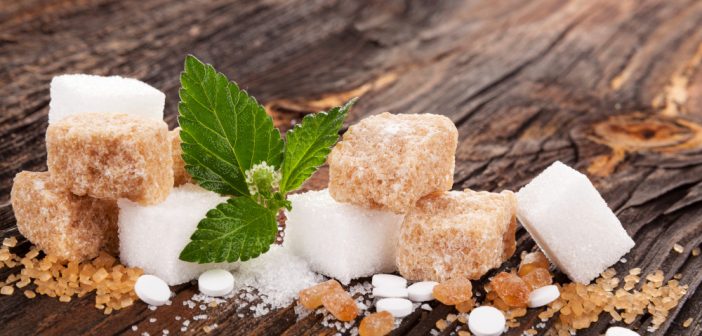Have you thought about switching from using sugar to artificial sweeteners? For most, the question around artificial sweeteners is whether or not they are successfully replacing sugar or if they are causing more problems. In 2020, 141.18 million Americans indulged in artificial sweeteners.
As many of us have a New Year’s resolution of maintaining a healthy lifestyle, it is essential to understand what items will help us achieve our goals. Could artificial sweeteners really be the key to living our ideal lifestyles? Let’s explore the benefits and drawbacks of several sweeteners.
Sugar Alternatives
You may have heard of stevia, sucralose, and other low-calorie sweeteners, but how much do you know about how they are made and where we get them from? Here is a short background on some of the more popular sweeteners that can be found in everyday products.
- Stevia: Stevia is extracted from the stevia rebaudiana plant (also known as candyleaf). It goes through a purifying process to remove any bitter taste. One of the many benefits of stevia is it contains zero calories. If stevia has been properly purified, it is safe for consumption.
- Sucralose: Sucralose is sugar manufactured through a process whereby three atoms of chlorine are exchanged for three hydroxyl groups. Similar to stevia, it has no calories.
- Luo han guo: Luo han guo, better known as monk fruit, originates from southern China. This well-liked sweetener also has zero calories and has been sound since 1976.
- Aspartame: Aspartame is often found in candy and drinks. It is made up of phenylalanine and aspartic acid. These acids naturally occur in our bodies, making them not too hard to digest. While aspartame is not calorie-free, it only contains 4 calories per gram.
- Acesulfame potassium: This sweet sugar switch is just like it sounds: it’s made of acetoacetic acid and potassium. This is a great option for homemade goods as it helps retain the quality of the food for zero calories.
- Neotame: One more great sweetener to use when baking a dessert is neotame due to its natural pH balance. It is closely related to aspartame, although it has a few more benefits: It has a lower price point and, unlike aspartame, doesn’t pose a threat to individuals with phenylketonuria.
- Advantame: The prize of being 20,000 times sweeter than sugar goes to advantame. This marvelous sweetener is created by combining aspartame and vanillin.
Benefits of Sweeteners
There are numerous advantages that come along with substituting sugar. For example, people living with diabetes are able to use synthetic sugar to reduce their chances of gaining weight. Even better, several of these sweeteners include added fiber, vitamins, antioxidants, and minerals.
Potential Side Effects
While all of these replacements sound like a great deal, there are a few side effects that come along with them. If you find yourself experiencing any of these side effects—digestive issues, changed taste perception or weight gain—reduce your intake or try another alternative. Approach sugar alternatives with a healthy mindset, knowing that these supplements should be used with a well-balanced diet.
Thanks to artificial sweeteners, we are able to indulge in delicious treats for a fraction of the calories, making alternative sweeteners a great option. So, the next time you are baking a cake or just need your coffee a little sweeter, give one of these seven substitutes a try.
A version of this article was published by The Daily Herald. It has been republished here with permission.




